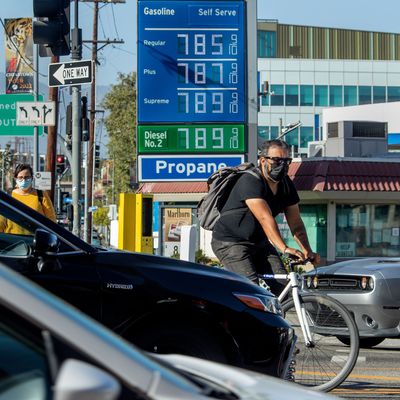
Driving a car is a cool, fun, glamorous leisure activity. The Magnetic Fields, a popular and relevant band, wrote a whole song about how owning an automobile makes you a more attractive person. As a car owner, I believe this to be true. But most drivers have a problem: gas. Pumping it is not cool, fun, or glamorous. Getting it interrupts the whole flow of the drive and requires you to divert yourself onto some godforsaken off-ramp to a greasy little depot where you pay money to drain refined-petroleum product into your tank and breathe in fumes. (Except in civilized New Jersey, where they cater to you like royalty). And every day for months now, gas has gotten increasingly more expensive — making it even less cool, fun, and glamorous by relegating driving to something you need to do (like commute) or something that only the wealthy can do for fun (which sucks).
Summer is driving season in the U.S., when people drive an average of about 20 percent more than they do during the winter months, so you’d think that two pieces of gas-related news would mean some kind of relief. The first is local — with Governor Kathy Hochul instituting a gas-tax holiday by suspending the 48 cents the state collects per gallon through the end of the year. The second is much more global: OPEC+, the energy cartel dominated by Saudi Arabia and Russia, agreed to pump more oil than was previously expected. More gas for less money, right? No — it’s all going to backfire.
Remember that the world is at war — the kind of big geopolitical explosion that makes any little tax holiday or production increase so marginal as to be meaningless. Russia, the third-largest oil producer, has made itself into a pariah state since February, when it invaded Ukraine, and effectively lost its biggest customer this week when the European Union agreed to end most imports by the end of the year. Even if the U.S. has not actually declared war on Russia, the White House has led the way on a broad sanctions regime that has fundamentally changed the way the world operates — effectively isolating Putin’s regime from the global financial system. That’s 11 billion barrels per year that are, all of a sudden, tainted on the global market — decreasing the overall supply by such a degree that it would be impossible for the world to make up for it by increasing production.
This is already becoming apparent in the oil reserves. Stockpiles fell by more than 5 million barrels last week, according to the Energy Information Administration. That’s about four times the drawdown than was expected. This makes the OPEC+ increase of 648,000 barrels per day look like, in the words of one JPMorgan Chase analyst, “a cosmetic increase.”
Hochul’s plan is probably worse than just cosmetic, since it can only feed demand for more and more driving, giving people an excuse to get on the road when they might not have because they’re now saving a few cents per gallon. And since most people in New York City don’t own a car, if this works, it’s a giveaway to the wealthiest and people living upstate. (Then again, there were more than 11 million registered vehicles in the state in 2018, so it’s not like it’s some small constituency.) But the thing is that it might not even be that much of a break for drivers. Gas stations operate on thin margins — they make most of their money on things like candy, soda, and cigarettes — and lag behind changes in market price, so they’re unlikely to start ratcheting down what they charge immediately, especially if more people start to drive.
Keep in mind that Biden has tried all of these tricks before. He opened up the strategic reserves in April to the tune of about a million barrels per day — which, by the way, will need to get replenished at some point. He allowed for dirtier, cheaper gas. He tried to twist some arms down in Texas. And still we have $8 gas — at least for the wretched of the earth down in Southern California. The oil companies are absolutely loving this, of course, raking in record profits even as just about every other industry in the world races to lose money the fastest. Even if you don’t drive, or do so rarely enough that it doesn’t matter, oil prices figure into everything — food that’s grown with petroleum-based fertilizer, rent in buildings with oil and gas heating, buying anything that needs to get delivered. The reality is that if somebody out there is getting a gas-tax holiday, it probably isn’t you.






























